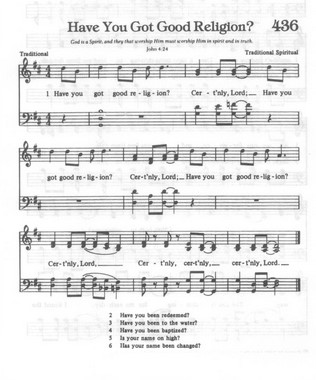Do we have it?
“Have You Got Good Religion?” is an African American gospel song which imagines a series of questions Jesus might ask believers.
After the opening query, “Have you got GOOD RELIGION?”, there are five (5) additional questions which Jesus asks. The individual then answers with an emphatic response, “Certainly Lord!” As there have been many renditions of this song, there also have been many modifications to the “original” questions.
For this teaching, I’d like to share the original verses:
- Have you been redeemed?
- Have you been to the water?
- Have you been baptized?
- Is your name on high?
- Has your name been changed?
The occasion or background for this dialogue is not given nor is it even important. But as I purview the Church in the 21st century and the role of each of us as believers, I find the questions very appropriate.
Do we have good religion?
What is religion?
The origin of the word religion is from Latin religio or religare which means “obligation, bond, or to bind”. Modern classification describes religion as a particular system of faith and worship. It is also belief in and worship of a superhuman controlling power especially a personal God or gods.
I’m sure one time or another our faith walk has been described in terms of how we pursue our “religion.” As we share our beliefs as it relates to world events, we might be told, “you are taking this religious thing too far!” Or as we refuse to acquiesce to some immoral or dishonest act, we may be accused as being “too religious”.
So what is good religion?
I concur with both definitions of religion put forth earlier. I worship only One God, the Creator and Sustainer of all life (Ps. 104). He is the ruling authority in my life. My Lord and Savior Jesus the Christ redeemed me and translated me from darkness into light (1 Pet. 2:9). Jesus lives in me through His Holy Spirit who empowers and guides me in all things. I am a Christian and I worship God in spirit and in truth (John 4:24).
We must be careful however, not to allow man-made rituals and practices to keep us from true righteousness—being in right relationship with God AND with each other. Such was often the case with the Pharisees who often mistaken religious activities for true worship and love for God (Matt. 15:1-20). Sadly, we see this in our churches who cling to history and tradition. These often result in the quenching of the Holy Spirit.
What’s in a song?
I think the questions put forth in the song, help us to define what “good religion” looks like. Then we can begin to examine ourselves to see if we are still of the faith (2 Cor. 13:5).
-
- Have you been redeemed? To be redeemed means we have accepted Jesus as our Lord and Savior. We no longer belong to Satan but are now part of God’s family. (Titus 2:11-14)
-
- Have you been to the water? Have you been baptized? Baptism is our public testimony to our willingness to follow Jesus. It is our external witness to our allegiance to Him. (Rom. 6:3-4)
-
- Is your name on high? “On high” refers to “heaven” where the Book of Life is kept until Judgment Day (Rev. 20:11-15). In it are the records of all people considered righteous before God. Our name is in the Book because we have Christ’s imputed righteousness. (2 Cor. 5:19).
-
- Has your name been changed? Our name is the source of our identity. Biblical name changes were the result of spiritual identity changes in the life of those who have been with God, i.e., Abram to Abraham, Sari to Sarah, Jacob to Israel. Our spiritual identities are changed when we become new creatures in Christ (2 Cor. 5:17).
How would we respond?
If God were to pose the six questions contained in our song today, can we say emphatically. “Certainly Lord?” What would be our proof?
F.B. Meyer, noted theologian shared this description on religion—I offer it as my definition of “good religion.”
In Matthew 15:16, our Lord teaches that true religion is certainly not a matter of eating and drinking or outward ceremony. It is the intention of the soul, the continual drawing from Christ the life power needed for our work and ministry to others.
Is our life a witness to God’s power and love? Have we joined Jesus in His work to serve in this fallen world? If we can say, “Certainly Lord!” then our life and works become a testimony of our “good religion.” (2 Cor. 5:14-15).










